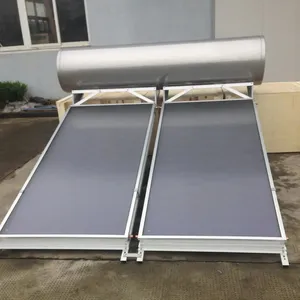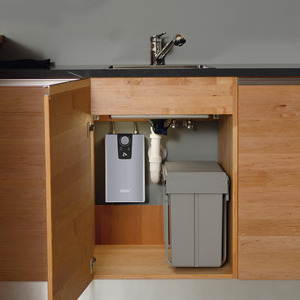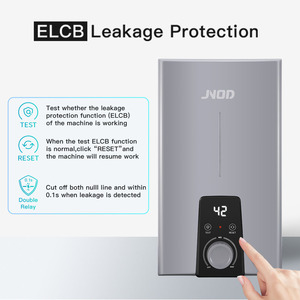
All categories
Featured selections
Trade Assurance
Buyer Central
Help Center
Get the app
Become a supplier

(6497 products available)




















































The constant temperature water heater, also known as a thermostatically controlled water heater, is available in different models. Each model has distinct advantages that suit various needs in constant-temperature water heating.
Instant Water Heater
Modeling after the water heating technology of Europe, the instant water heater heats water as soon as it flows into the heater without delay. The instant water heater is ideal for small households or where the demand for heated water is low because the heater can meet the demand to save energy. The instant water heater is easy to install and is available in electric or gas-operated models.
Storage Water Heaters
The storage water heater stores a large quantity of water in an insulated tank. The stored water is kept at a set constant temperature. The model comes in various capacities from forty liters to four hundred liters. The water heater with a higher storage capacity can meet the hot water requirements of large households, hotels, or factories. Although, the storage water heaters are available in gas or electric-operated models, the gas-powered heaters are more energy efficient.
Solar Water Heater
When looking for the most energy-efficient constant temperature water heater, solar models are ideal, depending on the availability of sunlight in the area. The solar water heaters use both sunlight and electricity or gas to heat water. When there's insufficient sunlight for water heating, the systems can use electricity or gas to run the water heater. The solar models have storage tanks for holding heated water.
Heat Pump Water Heater
Another constant-temperature water heater that reduces energy consumption while saving costs is the heat pump model. The heaters use electricity to work but are more energy-efficient than the conventional water heaters. They work best in moderate climates where temperatures are between 40 - 90 degrees F.
Commercial Water Heaters
Commercial constant temperature water heaters, large-capacity models, are suitable for commercial purposes, industrial operations, or large establishments. The models are available in various fuels: propane, diesel, gas, or electric. They have powerful heating systems to quickly heat up a large quantity of water. Some models have advanced technology for maximum heating efficiency.
Heating and Temperature Control:
Constant heaters provide accurate heating and temperature control. The liquid medium's thermometer and the controller compare the actual and set temperatures. If the difference is above the specified range, it sends an electric signal.
Mixing Device:
Mixing liquid keeps the temperature uniform, ensuring even heating. A constant temperature water heater can prevent scalding. People can set a safe water outlet temperature. The anti-scald device automatically cuts off power when the temperature exceeds 85°C. It also has a pressure relief outlet to release excess pressure and prevent explosions.
Material:
These water heaters use corrosion-resistant materials. The tinned copper pipeline offers long service in hot water supply systems. Good insulation minimizes heat loss. Closed fans maximize heating space and transfer warmth efficiently.
Controllers and Sensors:
A constant temperature water heater controller regulates temperature, pressure, heating time, and power. It cuts off power when overheating or boiling. Controllers take varying degrees of difficulty to operate, from simple knobs to complex touch screens. Mount sensors and controllers in a safe area and far from outlets.
High Efficiency and Safety:
These heaters ensure efficient water heating. Their precise temperature control is vital for industrial applications. A temperature control water heater can also boost energy savings. Efficient heating and good insulation cut power use and reduce operating costs. These heaters also have multiple safety measures. These include regular maintenance, automatic power cut-off, pressure relief valves, and corrosion-resistant materials.
Temperature-regulating water heaters are widely used across various industries. These industries include :
Food and Beverage Industry
The food and beverage industry uses temperature constant water heaters for precise temperature control during food preparation stages such as brewing, baking, cooking, and sanitizing. These heaters maintain consistent temperatures needed to activate enzymes in the dough when baking. In brewing, they help maintain specific temperatures required for fermentation. The heaters also aid in food cooking and sanitizing by keeping the water at the required temperatures. Temperature control helps to activate the necessary enzymes required by the food industry.
Hospitality Industry
Hotels, resorts, and restaurants extensively use constant temperature water heaters for various applications. These water heaters provide guests with on-demand hot water for bathing, cooking, and spa treatments. Restaurants rely on these heaters to provide hot water for dishwashing, laundry, and food prep.
Healthcare Facilities
Temperature-regulating water heaters play a crucial role in healthcare settings. They provide hot water for surgical scrubs, equipment sterilization, laundry, and patient care. These heaters ensure the water reaches the required temperature for cleaning and sterilizing medical equipment.
Residential Use
Temperature constant water heaters can be used in residential areas for heating water for showers, sinks, and tubs. They offer a steady temperature without the need to adjust the faucet.
Industrial Cleaning and Processing
Industrial factories use constant temperature water heaters to heat water for washing parts, equipment, and other manufacturing items. The consistent temperature helps dissolve grease and removes dirt.
Aquaculture
Aquaculture is the farming of fish and other aquatic animals. Temperature regulating constant water heaters are often used in aquaculture to maintain consistent water temperature for fish and other aquatic animals.
Commercial Buildings
Commercial buildings also make use of the heaters for space heating or to provide domestic hot water for toilets.
Before buying a constant temperature water heater for bathroom renovation, buyers should consider water flow needs, property size, power source, emergency heating, energy efficiency, and control preferences. They should also analyze the specific installation requirements of their property and ensure that the constant temperature water heater they are purchasing complies with local regulations. Buyers should choose a reliable supplier and check for certifications and warranty offered on the product.
Q1: What is the difference between a tankless and constant temperature water heater?
A1: A tankless water heater provides on-demand heating of the water as it passes through the coils. It provides constant temperature water by heating the water consistently under the same conditions. Tankless options can save considerable energy and space.
Q2: Can I use a constant temperature water heater with solar panels?
A2: These heating systems are compatible with solar water heating systems. There is a backup heating option for cloudy days or high hot water demands. The constant temperature water heater can be integrated into the solar water heating system to keep the water consistent.
Q3: What maintenance does a constant temperature water heater need?
A3: Regular maintenance is needed to keep the heater running smoothly. Check the manufacturer's guidelines for service intervals. Annual maintenance will include checking the valves, flushing the tank to remove sediment, and inspecting the heating elements.
Q4: How long can a constant temperature water heater last?
A4: With regular maintenance and good water conditioning systems, a constant temperature water heater can last 20-30 years. A tankless water heater also has a long lifespan of up to 20 years. Factors like usage patterns, maintenance, and quality of water will affect the lifespan.
Q5: How can a constant temperature water heater be controlled?
A5: The water heater's control system offers easy adjustment of desired temperature settings. It usually comes with digital displays, user-friendly interfaces, and safety features like child locks. Users can have peace of mind with enhanced control of hot water temperature.